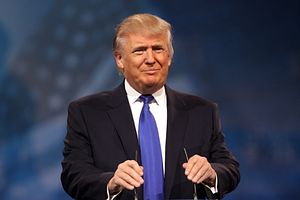What will the foreign service look like under President Donald J. Trump?
Over the past few months, rumors have emerged of the potential for mass resignations in the professional foreign policy bureaucracy in the event of a Trump victory. As Trump’s chances appeared to fade, these discussions melted into the background. Now, after his stunning electoral college victory, concerns have re-emerged about an explosive split between the incoming Trump administration and the corps of foreign affairs officials that work on the front lines of American foreign policy.
The professional foreign policy bureaucracy, in the form not simply of Foreign Service Officers but also of a constellation of officials from all over the executive branch, manages the day-to-day work of American foreign policy. In the Asia-Pacific, these bureaucrats look out for the interests of American tourists, manage the concern of American businesses, keep tabs on domestic opinion in foreign countries, and represent the broad interests of the U.S. government and society.
As of yet, we have little evidence to indicate that mass resignations are in store. However, if the Trump administration attempts a significant revision of U.S. foreign policy in the Asia-Pacific (or elsewhere) swaths of the bureaucracy may threaten to resign in protest. Although the foreign policy bureaucracy is professional and non-partisan, it was well understood that national security and diplomatic officials from both parties strongly opposed Trump. In September, a group of retired U.S. diplomats released a letter harshly critical of Trump. Many of these officials (including dozens of former ambassadors) continue to have important links to the State Department, which suggests that they may broadly represent opinion within the professional foreign policy bureaucracy.
Moreover, Trump argued on the campaign trail that many of the job protections traditionally accorded to federal employees should be eliminated, a process which would make foreign service far less appealing for many individuals. While Trump would find it difficult to fire government employees en masse, he could easily take steps to freeze hiring (making jobs more difficult for existing employees), reduce benefits, and reduce job security in the long term.
Again, we have little to go on regarding the future of Trump’s foreign policy apparatus. However, it’s worth paying attention to how the lower, professional echelons of foreign service workers react to the president-elect. These people have committed themselves to careers in public service, and many feel themselves obliged to continue this service whether or not they agree with a particular president. Moreover, some within this community have argued that Trump represents a special obligation for professional bureaucrats; with little foreign policy experience, Trump will need to advice and service of a competent corps of officials.
Indeed, many foreign service workers also appreciate the need to convey continuity-of-policy to jittery U.S. allies. As retired Ambassador Carey Cavanaugh notes, “Trump’s statements regarding policy toward China, Japan, and Korea — in particular regarding nuclear weapons — have created a great deal of unease. While he has been generally dismissive of expertise, he will need to make deft use of the Foreign Service to quickly reassure our friends, and put our foes on notice, regarding the approach his administration will likely take.”
Many within the service will take a wait-and-see attitude. Donald Trump’s presidency may or may not represent an inflection point in post-Cold War American foreign policy. His Asia-Pacific commentary, in contrast to his provocative statements on the rest of the world, isn’t terribly far from the outer bounds of the established consensus. If he diverges too far from this consensus (on trade, on alliances, on relations with China), however, then even the professionally inclined foreign policy bureaucrats may consider jumping ship. This could have dramatic long-term consequences for Americans trying to visit, work, and invest in East Asia.

































